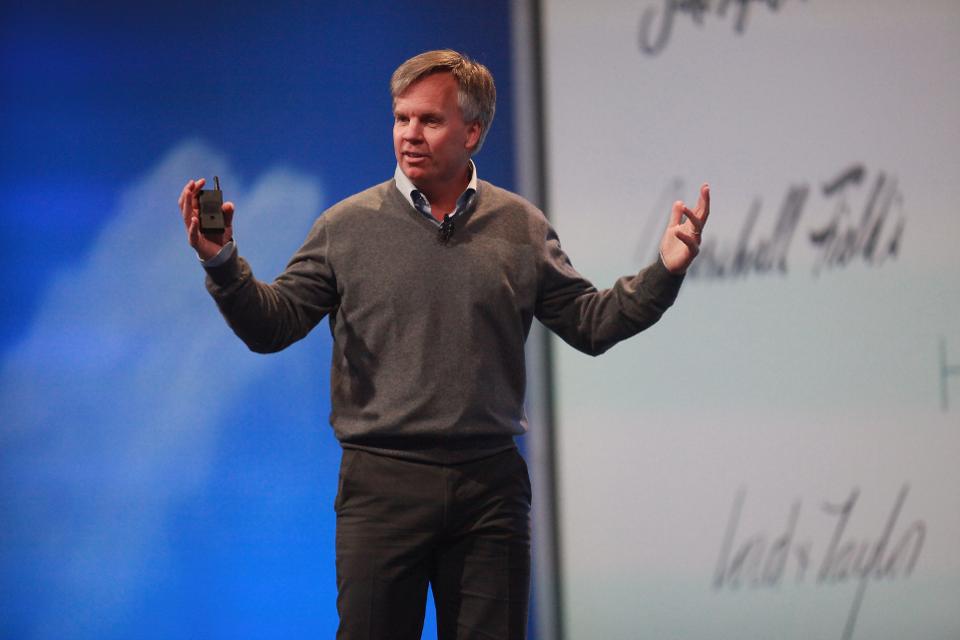In a world where consumers desire both the convenience of online shopping and the in-person interaction offered by brick-and-mortar retail stores, Ron Johnson, former Apple retail stores chief and former J.C. Penney CEO, had an idea to marry the two: a mobile retail store that delivers goods to you in the comfort of your home.
“There’s a new channel of commerce,” Johnson said in an interview. “When you order online, we are bringing the product to you. It solves the pain point of online shopping and store experience. That’s very different from dumb delivery online on your doorstep.”
After his failed attempt to turn around J.C. Penney, which led to his ousting in 2013 after only 18 months on the job, Johnson cofounded Enjoy Technology in 2015. It works with major telecom carriers—AT&T in the U.S., British Telecom in the U.K. and Rogers in Canada—to offer white-glove same-day delivery and setup service of phones and other products for free to those carriers’ customers in their homes or another location of their choice.
What’s in it for Enjoy and those carriers?
Over 50% of those visits have resulted in customers buying accessories like a phone case, a smart watch or a warranty plan, or signing up for, say, AT&T TV or high-speed internet service, Johnson said. Enjoy in turn gets paid by its partners based on the incremental profit it generates for them on each visit.
“When you ask an Apple store employee what’s the common thing a customer says to you after a great experience, it’s ‘I wish I could take you home with me,’” said Johnson, CEO of the four-year-old startup. “I’ve been watching e-commerce grow for 20 years. Every product has the same last mile. Apple creates a premium last-mile store. How should a premium brand go to market for customers buying online? We extend that online-purchasing experience and bring everything you do in the store to the home. It’s smart last mile.”
Johnson knows what he’s talking about. A ten-plus-year Apple veteran, he pioneered Apple’s retail store concept featuring its Genius Bar and free classes—a model now widely copied. He also helped make Apple stores the envy of the retail industry, with data showing they boast far higher sales per square foot than even luxury retailers like Tiffany and Saks.
A 15-year veteran at Target, he helped the Minneapolis-based discount retailer create its cheap-chic identity and compete with Walmart by inking its first—and now famous—run of designer product partnerships, beginning with architect Michael Graves.
As to his J.C. Penney run, I asked Johnson if Enjoy is a vindication of sorts.
“I don’t look at the world that way,” he said. “I like tackling hard problems. … I was going (to Penney) to reinvent the department store. … I misjudged the appetite of the company to make changes. … I went too fast for all stakeholders concerned. … Things take time.”
(J.C. Penney sales continued to decline even after it returned to its prior strategy and did away with Johnson’s bid to introduce “fair and square” pricing and eliminate coupons.)

Enjoy says it’s made over 1 million visits to customers’ homes or other places of their choices … [+]
ENJOY
Since its first delivery in 2015, Enjoy has made over a million customer visits, and last year it expanded to Canada and the U.K. with the Rogers and BT deals. The Palo Alto, California-based company has grown its full-time workforce to nearly 2,000, a majority of whom are what Johnson describes as “experts” who work ten hours a day, four days a week, and pick their own schedules in what he sees as a competitive edge to attract talent in a tight labor market.
Staff visit on average seven to eight customers a day, he said, adding that customers requesting in-person delivery run the gamut of ages.
“Younger people like the convenience, and older people like help with the technology,” he said.
Enjoy has expanded to U.S. cities from Los Angeles and Seattle to Philadelphia and Miami. It has raised more than $350 million in venture capital funding, giving it a valuation of just under $1 billion. Johnson said the startup will turn profitable “within quarters.” Taking the company public is also a possibility, he said.
He declined to specify what other markets and product categories Enjoy might consider expanding to beyond its current focus on consumer electronics. While the deal with telecom carriers like AT&T is exclusive and prevents Enjoy from working with rivals like Verizon, he said that doesn’t preclude Enjoy from working with other partners including brand manufacturers.
“We have built a scale to do mobile commerce in the U.S., the U.K. and now Canada,” said Johnson, 61. “This is the inflection point and the year when we turn the volume. … This still has a chance to be the most significant work of my career. We are where Apple was in 2004. We are very early in the journey.”
FORBES

